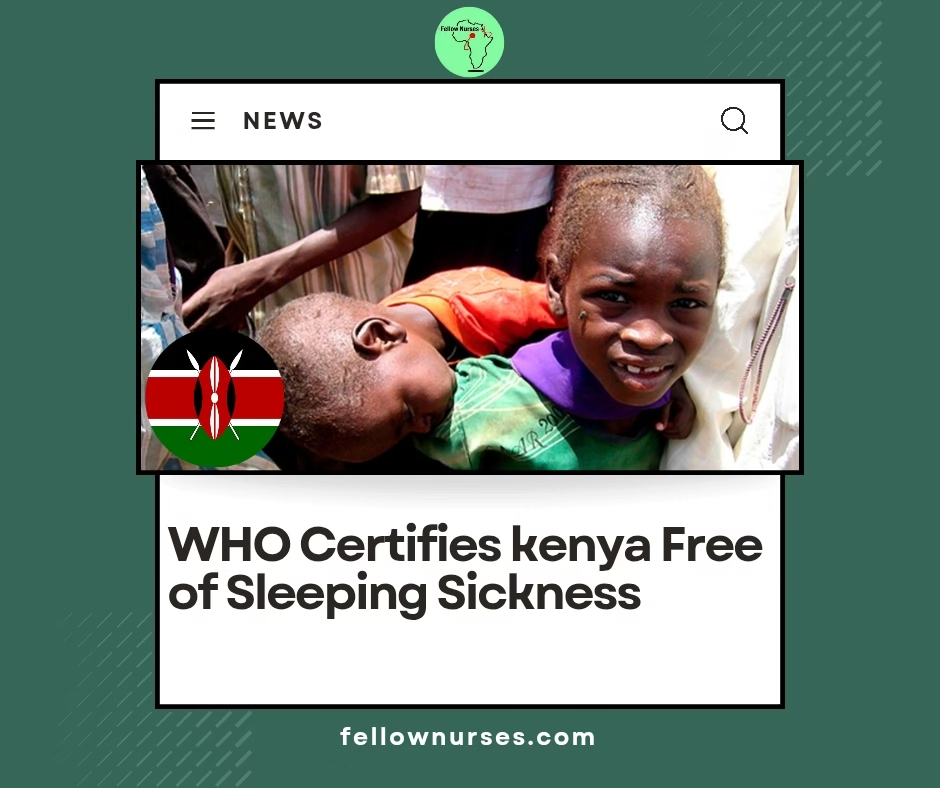Fellow Nurses Africa, Lagos, Nigeria. 09 August, 2025.

Kenya has etched its name in global health history books after the World Health Organization (WHO) officially certified the East African nation as free of human African trypanosomiasis, popularly known as sleeping sickness, following decades of sustained public health campaigns.
The momentous certification, announced on August 8, 2025, positions Kenya among an elite group of nations worldwide to successfully eliminate this deadly parasitic disease that has plagued African communities for generations.
A Battle Won Through Persistence
The journey to elimination was neither quick nor easy. Kenya’s success story is built on years of meticulous surveillance programs, aggressive tsetse fly vector control measures, comprehensive community awareness campaigns, and crucial cross-border collaboration with neighboring countries.
Sleeping sickness, transmitted through the bite of infected tsetse flies, attacks the human central nervous system and proves fatal without proper treatment. The disease has historically devastated rural communities across sub-Saharan Africa, making Kenya’s achievement all the more significant.
“This certification represents more than just a health victory; it demonstrates Africa’s capacity to overcome its most challenging public health obstacles,” said Dr. James Macharia, Kenya’s Principal Secretary for Health.
Continental Recognition and Inspiration
The African Leaders Malaria Alliance (ALMA) has lauded Kenya’s achievement, describing it as compelling evidence of what becomes possible when political commitment meets community action and sustained financial investment.
“This is proof that Africa can win the fight against neglected tropical diseases when there is political will, community action, and sustained investment,” ALMA stated in their congratulatory message to the Kenyan government.
The Fight Continues
Despite the historic certification, Kenyan health authorities have emphasized that vigilance remains crucial. The elimination status does not signal the end of monitoring efforts, as continuous surveillance is essential to prevent potential re-emergence of the disease.
Officials have particularly stressed the importance of maintaining robust monitoring systems in historically affected rural areas, where the risk of re-introduction remains highest due to cross-border movement and environmental factors.
Setting the Pace for Africa
Kenya’s sleeping sickness elimination success story serves as a powerful blueprint for other African nations grappling with vector-borne diseases. The achievement demonstrates that with proper planning, adequate resources, and sustained political commitment, even the most entrenched health challenges can be overcome.
Public health experts across the continent are studying Kenya’s elimination strategy, hoping to replicate similar successes in their respective countries. The certification is expected to inspire increased investment in neglected tropical disease programs across sub-Saharan Africa.
Global Health Significance
The WHO certification places Kenya in distinguished company among the few nations worldwide to achieve sleeping sickness elimination. This milestone contributes significantly to global efforts aimed at eliminating neglected tropical diseases by 2030, as outlined in the WHO’s roadmap.
Kenya’s success also bolsters Africa’s growing reputation as a continent capable of leading innovative public health solutions, challenging long-held perceptions about the region’s capacity for disease eradication.
As Kenya celebrates this historic public health victory, the nation stands as a beacon of hope for millions across Africa still affected by neglected tropical diseases, proving that elimination is not just possible but achievable with the right approach and unwavering commitment.
Fellow Nurses Africa is the independent voice of African nurses. We educate, inform and support the nursing profession.










